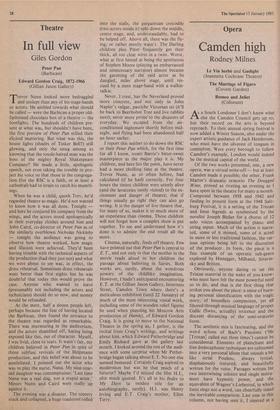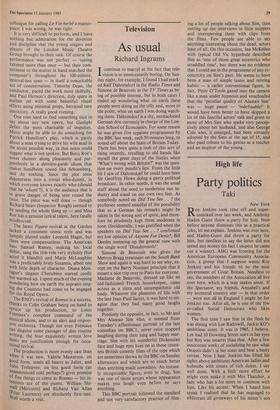Opera
Camden high
Rodney Milnes
Romeo and Juliet (Coliseum)
Aa South Londoner I don't know what else the Camden Council gets up to, but their record on the arts is beyond reproach. To their annual spring festival is now added a Winter Season, also under the expert artistic guidance of Jack Henderson, who must have the silverest of tongues in committee. Were every borough to follow Camden's example, London would indeed be the musical capital of the world.
Of the two works presented, one, a new opera, was a virtual write-off — but at least Camden made it possible; the other, Frank Martin's dramatic oratorio The Drugged Wine, proved as riveting an evening as I have spent in the theatre for many a month. Composed between 1938 and 1942 and finding its present form at the 1948 Salz- burg Festival, it is a setting of the Tristan and Iseut legends as synthesised by the novelist Joseph Bedier for a chorus of 12 solo voices accompanied by piano and string septet. Much of the action is narra- ted, some of it mimed, some of it acted in more or less traditional fashion, the var- ious options being left to the discretion of the producer. In form, the piece is a fine example of an operatic sub-genre explored by Honegger, Milhaud, Stravin- sky and Britten.
Obviously, anyone daring to set the Tristan material in the wake of you-know- who must have felt the most powerful need so to do, and that is the first thing that strikes you about the piece: a sense of burn- ing personal identification with the tragic story, of boundless compassion, yet all filtered through musical language of proper Gallic (Swiss, actually) reticence and the discreet distancing of the semi-oratorio form.
The aesthetic mix is fascinating, and the weird echoes of Bach's Passions ('He [Tristan] called out three times') cannot be coincidental. Elements of plainchant and free dodecaphonic techniques are subsumed into a very personal idiom that sounds a bit like serial Poulenc, always lyrical, diaphanously textured, and beautifully written for the voice. Passages written for two intertwining soloists and single instru- ment have hypnotic power, and the equivalent of Wagner's Liebestod, in which Iseut sings not a word, can cheerfully stand the inevitable comparison. Last year in this column, not having seen it, I sneered at a
colleague for calling Le. Vin herbe a master- piece: I was wrong, he was right. It is very difficult to perform, and I have nothing but admiration for the devotion and discipline that the young singers and players of the London Music Theatre Group brought to their task. Of course the performance was not perfect — tuning faltered more than once — but their com- mitment to the matter in hand matched the composer's throughout the 100-minute, interval-less span — in itself a remarkable act of concentration. Timothy Dean, the conductor, paced the work most skilfully, and Paul Hernon's direction, duly spare in outline yet with some beautiful visual effects using minimal props, betrayed rare sensitivity. A really good evening. One tries hard to find something nice to say about any new opera, but Gaslight defies the most charitable of impulses. Music might be able to do something for Patrick Hamilton's play, which is partly about a man trying to drive his wife mad in the nicest possible way, in that notes could suggest what is not spoken. But Betty Roe's notes chunter along pleasantly and pur- poselessly in a derriere-garde idiom that makes Sondheirn sound like Schoenberg, and do nothing. Since the plot soon degenerates into a trivial who-dunnit, in which everyone knows exactly who (should that be 'whom'?), it is the audience that is In grave danger of being sent round the twist. The piece was well done — though Richard Suart (Inspector Rough) seemed to be sending the whole thing up — and Miss Roe has a genuine lyrical talent, here fatally misdirected. The latest Figaro revival at the Garden lacked a consistent comic style and was lumpily played under Leopold Hager, but there were compensations. The American bass Samuel Ramey, making his local debut, sang the title-role very stylishly (but acted it blandly) and Marie McLaughlin was a predictably lively Susanna, albeit one with little depth of character. Diana Mon- tague's elegant Cherubino started coolly but warmed up. I spent much of the evening Wondering how on earth the soprano sing- ing the Countess had come to be engaged for the Royal Opera. The ENO's revival of Romeo is a success, thanks to Colin Graham being on hand to spruce up his production, to Louis Fremaux's complete command of the musical idiom, and to an alert and respon- sive orchestra. Though not even Fremaux Can disguise some passages of dim routine writing, the four exquisitely written love duets are justification enough for occa- sional revival. The production is more evenly cast than when it was new, Valerie Masterson. on good form, steals all hearts as Juliet, and John Treleaven, on less good form (an unannounced cold perhaps?) gives promise of fine things to come as Romeo — his in- tentions are of the purest. William Shi- mell (Mercutio) and Richard Van Allan (Friar Laurence) are absolutely first-rate. Well worth a visit.







































 Previous page
Previous page